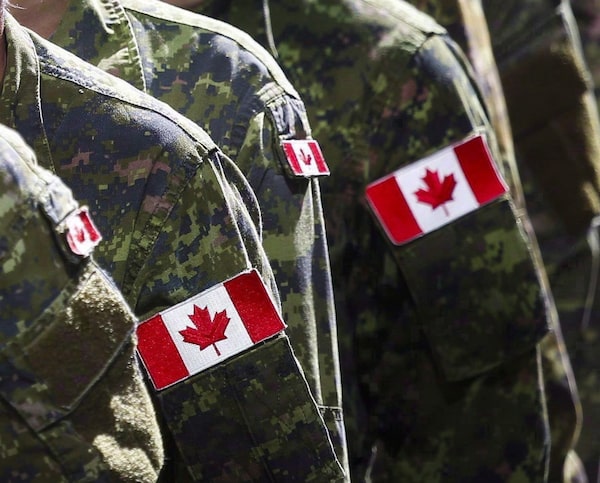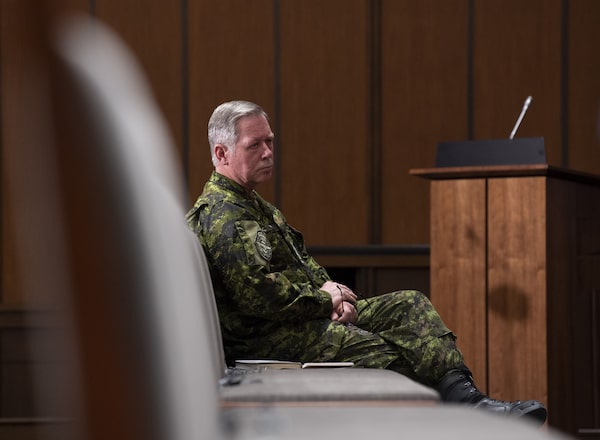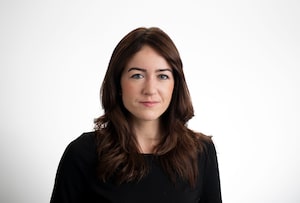
Members of the Canadian Armed Forces march during the Calgary Stampede parade in Calgary, Friday, July 8, 2016.Jeff McIntosh/The Canadian Press
The federal government’s decision to appoint Louise Arbour to lead an independent review of the military’s handling of sexual assault, harassment and other misconduct takes place in the wake of months of criticism of the military’s culture and the way it responds to such cases.
Ms. Arbour has the responsibility to provide recommendations on how the military and the Department of National Defence can set up an independent, external reporting system for those affected by misconduct. Six years ago, another former Supreme Court justice, Marie Deschamps, recommended an independent mechanism.
Former Supreme Court justice Louise Arbour to review sexual harassment, misconduct in the military
Two parliamentary committees have been studying the issue of sexual misconduct in the military. In addition, three military police investigations are under way into the conduct of former chief of the defence staff Jonathan Vance, Admiral Art McDonald and Vice-Admiral Haydn Edmundson.
In the past few months, Prime Minister Justin Trudeau and Defence Minister Harjit Sajjan have faced mounting pressure over what they knew about an allegation made against Mr. Vance three years ago, and whether they failed to act.
At the same time, stories of sexual trauma in the military have sparked a national dialogue on the prevalence of misconduct in the Canadian Armed Forces and what is being done to confront it.
What military women have said
Women of the Canadian Armed Forces (CAF) say there is an inherent problem with the military’s culture and they have shared their experiences, ranging from complaints of verbal harassment to sexual assault and rape, with the House of Commons status of women committee.
Emily Tulloch, an aviation technician, told MPs on the committee that she joined the CAF in July, 2018, and feels as though she has experienced a lifetime’s worth of sexual assault and misconduct.
“I’m here today to tell you that I was raped only one month into my basic training. … I was also sexually assaulted during my training in Borden and I have been groped and kissed unwillingly at crew parties and mess events and these degrading behaviours are more common than you think.”
Ms. Tulloch said she has also been subjected to misogynistic and sexist comments throughout her career. And after reporting these incidents, she had a negative experience with the military justice system.
She said she had three interviews with military police and two of them were “dreadful,” adding that they felt more like interrogations. During her second interview, Ms. Tulloch said, she left early because she felt like she wasn’t being heard and that they were treating her like a criminal.
“No one should be treated like a criminal when they’re that vulnerable and in need of help,” she said.
Ms. Tulloch said there needs to be improved training for military police who conduct such interviews, and those who come forward should have the option of being interviewed by a member of the same sex.
She also said it is clear that military leadership has not been able to uphold the Forces’ high ethical standards.
As defence chief, Mr. Vance championed Operation Honour, established in 2015 to eliminate harmful and inappropriate sexual behaviour within the Forces. It was created after former Supreme Court justice Marie Deschamps issued a report on sexual misconduct within the military.

Chief of Defence Staff Jonathan Vance watches a news conference from the front row of seats Thursday, May 7, 2020, in Ottawa.Adrian Wyld/The Canadian Press
Ms. Tulloch said military leadership has been “willfully ignorant” that the operation has been viewed as a joke for years.
“For many of us, Op-Honour has aged like rotten milk and it just leaves a sour taste in your mouth,” she said.
In separate testimony, Major Kellie Brennan talked about her former alleged relationship with Mr. Vance. She said she was speaking up in hopes of giving a voice to other women who want to come forward.
Maj. Brennan alleges that the two were in a relationship while she was a subordinate, which she said began in 2001 and continued after he was named defence chief in 2015. Maj. Brennan said she disclosed this information to the Canadian Forces National Investigative Service (CFNIS).
She said Mr. Vance ordered her to lie about the relationship and that if she did not follow his orders, there would be “consequences.” She said Mr. Vance told her he was “untouchable,” that he owned the CFNIS and that he had Mr. Sajjan “under control.”
Maj. Brennan said the CFNIS interviewed her twice, for six hours on each occasion, as part of its investigation into Mr. Vance. She said she asked officers whether they had the mandate to investigate and the power to lay charges, but said they would not answer her.

National Defence Minister Harjit Sajjan and Chief of Defence Staff Jonathan Vance listen to a question during a news conference Friday, June 26, 2020 in Ottawa.Adrian Wyld/The Canadian Press
Maj. Brennan also said Mr. Vance is the father of two of her children, but that he takes no responsibility for them. “It’s all up to me,” she said.
Mr. Vance has denied any wrongdoing in an interview with Global News but otherwise has not commented on Maj. Brennan’s allegations.
Dawn McIlmoyle’s committee testimony shows how long the issue of sexual assault and harassment in the military has gone on. Ms. McIlmoyle, a registered nurse, said that when she left the military she felt betrayed, abandoned and at fault for what happened to her.
She went public with her story of being raped by a colleague in 1998. Her photo was on the cover of Maclean’s magazine with the accompanying headline: Rape in the Military.
Ms. McIlmoyle said after coming forward, she was embarrassed, saying people put her down and told her it didn’t happen. Ms. McIlmoyle said she wanted change, but it was swept under the rug.
Now, she said, people are thanking her for what she did, and she is still optimistic that change will happen.
Months of revelations, questions
The House of Commons defence committee began its probe of sexual misconduct in the CAF in February after media reports of allegations against Mr. Vance. For nearly three months, committee members questioned witnesses about what they knew concerning an allegation made against the former defence chief in 2018 and why the complaint fell through the cracks. Outside of committee, the Prime Minister faced questions about his knowledge of the allegation and whether he maintains confidence in his Defence Minister.
The controversy surrounding Sajjan’s response
The defence committee heard from Mr. Sajjan for the first time on Feb. 19. At that meeting, he said he was “shocked” at the allegations that were made public against Mr. Vance, two weeks earlier. He was asked repeatedly when he learned about the allegations. He said “any reporting or any allegations brought to me were always taken to the appropriate authorities very quickly and were taken very seriously.”
Defence Minister Harjit Sajjan speaks on a livestream during a virtual news conference, in Ottawa, Thursday, April 29, 2021.Sean Kilpatrick/The Canadian Press
Shortly after, former military ombudsman Gary Walbourne testified before the same committee that he told Mr. Sajjan three years earlier about an allegation of inappropriate sexual behaviour against Mr. Vance. Mr. Walbourne said he met with Mr. Sajjan on March 1, 2018.
Mr. Walbourne said he told Mr. Sajjan that an individual came forward in confidence, that the complaint was not formal, and he wanted the Defence Minister to get back to him on how to proceed. Mr. Walbourne said he tried to show Mr. Sajjan evidence, and that Mr. Sajjan refused to look at what he had.
Mr. Sajjan testified before the defence committee for a second time regarding the meeting between him and Mr. Walbourne. Mr. Sajjan said he refused to look at the evidence because he wanted to ensure the investigative process was independent and to ensure that there was no political interference. He said he considered the investigation open from the moment Mr. Walbourne received the complaint.
Canadian Forces ombudsman Gary Walbourne appears at a Senate veterans affairs committee in Ottawa, on May 4, 2016.Sean Kilpatrick/The Canadian Press
The Privy Council Office’s (PCO) Janine Sherman, who is responsible for senior personnel, testified that she met with Mr. Walbourne and did not receive information from him about the allegation “upon which to take further action.” Mr. Walbourne has repeatedly emphasized that the complainant had come to him in confidence.
Former Privy Council clerk Michael Wernick testified that he regretted no further action was taken regarding the allegation against Mr. Vance. Mr. Wernick said there were options for Mr. Sajjan, Mr. Walbourne and the Privy Council Office to do things differently. He said what happened created an “impasse.”
What did the PMO know?
Shortly after Mr. Walbourne’s testimony, The Globe reported that Mr. Sajjan’s chief of staff told Elder Marques, a senior adviser inside the PMO, three years ago that the minister was troubled by information about Mr. Vance.
On March 5, the Prime Minister told reporters that officials could not investigate an allegation against Mr. Vance because Mr. Walbourne would not provide further information. He said he continued to have confidence in the Defence Minister.
The following week, Mr. Trudeau confirmed The Globe’s reporting during Question Period, saying his office was aware in 2018 that Mr. Walbourne told Mr. Sajjan about the complaint. His office would not comment on whether the Prime Minister was briefed about the matter.

Prime Minister Justin Trudeau responds to a question during Question Period in the House of Commons, Tuesday, April 27, 2021 in Ottawa.Adrian Wyld/The Canadian Press
The Prime Minister then faced more criticism from the opposition for approving a bonus for Mr. Vance, even after his office was made aware of the allegation against the former defence chief.
Mr. Trudeau said for the first time on March 30 that he did not personally know about the allegation of sexual misconduct against Mr. Vance that was brought to the attention of his office in 2018.
On April 12, the defence committee passed a Liberal motion to end its study of sexual misconduct in the military and allegations against Mr. Vance. The motion passed with support from the Bloc Québécois.
However, at the following meeting, opposition members pushed to have Mr. Marques testify. He said in committee that Mr. Trudeau’s chief of staff, Katie Telford, knew about the allegation against Mr. Vance. Mr. Marques said Ms. Telford or her assistant requested that he contact the then-chief of staff to Mr. Sajjan on an issue about Mr. Vance.
After Mr. Marques’s testimony, Conservative MPs wrote to the clerk of the defence committee to request that it be reconvened to determine additional witnesses for its study on addressing sexual conduct in the CAF.
The MPs said that the testimony by the former senior adviser in the PMO contradicts that of Mr. Sajjan and calls into question the Prime Minister’s public statements that he was unaware of an allegation against Mr. Vance in 2018. The defence committee will meet Friday.
 Janice Dickson
Janice Dickson Kristy Kirkup
Kristy Kirkup